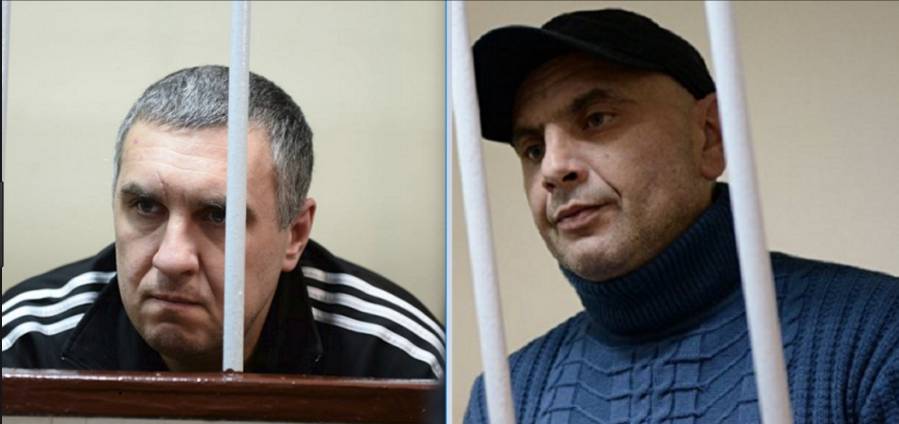• Topics / Human Rights Abuses in Russian-occupied Crimea
Forensic tests overturn Russian FSB ‘Ukrainian Crimea saboteur’ story

Nothing is going right with Russia’s attempt to concoct a Ukrainian Crimea saboteur plot and trial. First it reports events that did not take place, then the FSB’s ‘confessions’ are retracted with three of the four men arrested confirming that they were obtained through torture. Now not a single DNA trace or fingerprint has been found to link Yevhen Panov and Andriy Zakhtei with the weapons, etc. allegedly concealed in a cemetery near the Armyansk crossing between Crimea and mainland Ukraine. Only the Russian Investigative Committee is working in tandem with the FSB. It has refused to investigate the clear evidence backing Panov’s complaints of torture, despite the initial intervention of the European Court of Human Rights.
Zakhtei’s lawer Alexei Ladin first reported on May 30 that a comparative molecular analysis had failed to find any biological traces from Panov and Zakhtei on the items found, and that two fingerprint tests had also found nothing. The details were read aloud to the court on June 7, with Panov commenting that “my traces weren’t there because I wasn’t.”. According to his mother, Panov has lost weight since being seized by the FSB in August 2016, but is in fighting spirit. He has also studied the Russian criminal procedure code and knows how to ask the relevant questions.
Both Panov and Zakhtei were seized on August 7, 2016. On August 10, the FSB claimed that it had foiled terrorist acts planned by the Ukrainian Defence Ministry’s military intelligence. It asserted that there had been major incidents, with shelling from mainland Ukraine, during the nights from 6-7 and 7-8 August, with 2 Russians – an FSB officer and a soldier – killed. There are independent reports about something taking place in the early hours of Aug 7, though they suggest rather that an FSB officer died in a drunken brawl between Russian border guards and Russian FSB officers. There is nothing at all to back the claims about the second night and supposed shelling from Ukraine. There was another reason for scepticism about the Russian claims, namely that the alleged incidents had been preceded by Russian moves to block access to independent Internet websites and coincided with Russia’s deployment in occupied Crimea of a huge amount of military technology.
The only ‘proof’ came from televised ‘confessions’ from Panov; Zakhtei; Ridvan Suleymanov and Volodymyr Prysich. Three of the men have since stated that they said what they were told to, under torture. The charges that Suleymanov is now facing differ radically from what he supposedly confessed to, and Prysich was recently sentenced to 3 years on entirely different charges. Almost nothing is known about Prysich, but he was able to tell the court that he had been tortured, and that the ‘confession’ and the new charges were pure fabrication.
There are grounds for believing that both Panov, who is a former Ukrainian soldier and a volunteer in Energodar (Zaporizhya oblast) and Zakhtei were deliberately lured to the place where they were seized.
Both men have since given detailed accounts of the torture applied. Panov, who turned 40 on June 6, was kept from seeing the lawyer his family had appointed for two months. His family and human rights activists finally approached the European Court of Human Rights which demanded information about his access to defence and medical information. Russia initially tried to move the two men to Moscow, presumably to make it harder for them to receive legal assistance. When that didn’t work, they were returned to Crimea where they are being held in the Simferopol SIZO [remand prison].
Panov’s lawyer Olga Dinze reports that the scars from the torture are still visible now. He was held, he recounts, for three days with a black bag over his head, meaning that he could not identify the men torturing him. He was suspended on handcuffs and subjected to electric shocks, including to his feet. As well as the beating, the traces of which could be seen during his ‘confession’, he also faced a mock execution, with threats against both him and his family.
The evidence of torture and his accounts were given a cursory check by the Investigative Committee before being rejected.
The Crimean Human Rights Group has found multiple falsifications in this ‘case’, as well as clear evidence of illegal methods. It believes that 9 people were initially detained, though not all were charged as part of the FSB’s ‘Ukrainian Crimean saboteur’ plot.
>





